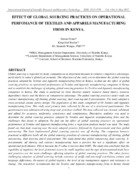| dc.description.abstract | Global sourcing is regarded by many companies as an important measure to enhance competitive advantages particularly in today’s globalized economy. The objectives of the study are to determine the global sourcing practices adopted by Textiles and Apparels manufacturing firms in Kenya, to find out the effect of global sourcing practices on operational performance of Textiles and Apparels manufacturing companies in Kenya and to establish the challenges of adopting global sourcing practices by Textiles and Apparels manufacturing companies in Kenya. The study is anchored on three theories namely resource based theory, resource dependency theory and the theory of comparative advantage. The global sourcing practices under study are contract manufacturing, off shoring, global sourcing, dual sourcing and E-procurement. The study adopted a cross-sectional census survey design. The population of this study comprised of 63 Textiles and Apparels manufacturing firms. This study used primary data collected by the use of a structured questionnaire. The questionnaire was administered using drop-and- pick-later method. The data collected was cleaned, validated, and edited for accuracy, uniformity, consistency and completeness. Descriptive statistics was used to determine the global sourcing practices adopted by Textiles and Apparels manufacturing firms and the challenges they faced in adoption. To find out the effect of global sourcing practices on operational performance of Textiles and Apparels manufacturing firms a regression analysis model was used. The study found out that dual sourcing was the most adopted practice followed by E-procurement and then global outsourcing. The least implemented global sourcing practice was off shoring. The companies however practiced at different levels all the global sourcing practices of contract manufacturing, off shoring, global outsourcing, dual sourcing and E-procurement. The study found that global outsourcing, dual sourcing, Eprocurement, off shoring and contract manufacturing have a positive but not a significant effect on operational performance. This is because the P-value is not less than 0.005. The study also concludes that the capability of suppliers; the level of internet access by small suppliers and the type of international trade laws and practices are the main challenges affecting adoption of global sourcing practices. The other factors challenging adoption of global sourcing include existence of tariffs and non-tariff restrictions, culture and language differences, the nature of global logistics, the level of top management support and resistance to change. The researcher recommends that the Textiles and Apparels manufacturing firms in Kenya should adopt global sourcing practices in contract manufacturing, off shoring, global sourcing, dual sourcing and Eprocurement. Another recommendation is for governments to have clear cut duty and reduced charges and to put conducive policies in place that will ensure that more global sourcing for textiles and apparels manufacturing companies is more fruitful. | en_US |
